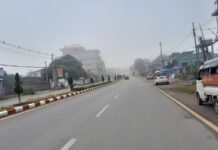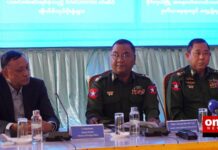Day Three. Wednesday, 29 March 2017
Diplomatic means can transform the smallness of a state into an asset.
(Anonymous)
Does anyone know which EAOs (otherwise ANSAs meaning armed non-state actors, as Geneva Call calls them) have signed the deed of commitment (DoC) for child protection?

Not me, for one. But no worry here, Because the GC’s Ms Taylor Landis is letting us know this morning who they are:
| No | Name of ANSA | DoC against Gender Discrimination | DoC for Ban of Anti-Personnel Mines | DoC for Protection of Children |
| 1. 2.
3. 4. 5.
6. | Chin National Front Karenni National Progressive Party Karen National Union New Mon State Party PaO National Liberation Organization Palaung State Liberation Front | √ (2014) —
√ (2013) — —
— | √ (2006) —
— — —
√ (2007)
| √ (2014) √ (2012)
√ (2013) √ (2012) √ (2014)
— |
| Total | 2 | 2 | 5 |
But why should we sign when, for instance, we’ve learned from the American history that thousands of young boys under 18 served in both the Revolution and the War between the States?
The answer is that the world’s attitude has changed since, and signing these DoCs is one way the ANSAs can outreach the world as (more or less) legitimate actors. Because they need all the support they can get to win their cause.
The Geneva Call meanwhile is holding several discussions and workshops with other EAOs/ANSAs, including the RCSS/SSA and DKBA.
The next item on the agenda is the update on the ongoing peace process since November 2016, when the 8th Liaison Officers Conference was held. From one of the three updators, I have learned the following:
- We say we haven’t got enough.
Meanwhile, the government-military bloc is saying they’ve conceded more than necessary
- Us signatories say, “We are speaking for the non-signatories.” The government thinks we’ve been demanding more, after holding meetings with the non-signatories. But some of the non-signatories are still calling us traitors.
It seems we are being trampled upon by both sides.
- We are facing difficulties implementing the NCA. (Some have advised that one big reason is the difference in the interpretation of the NCA and the bilateral agreements, which therefore calls for a thorough review of them.)
- Non signatories say we are not sticking to the Tripartite Dialogue stance that was adopted at the 1994 UN General Assembly: The military government, the non-Burman ethnic movements, and the NLD led democratic opposition.
Well, if they look only at the Union Peace Conference 21st Century Panglong (CPU 21 CP), their argument may be correct. As representatives are from the following 7 categories: government, legislature, military, EAOs, political parties, other ethnicities, and relevant representatives. But, if they look deeper, they’ll find that the decisions are made at the Union Peace Dialogue Joint Committee (UPDJC), which is comprised of 16 representatives each from the government-legislature-military bloc, the EAO bloc and the political parties bloc. (Which begs another question: Does it mean the UPC 21CP is just a showpiece?)
Then come the reports on yesterday’s exercise on the challenges the liaison offices are facing and how they are dealing with them. The following are excerpts:
- Common challenges include: land confiscations, drugs—widespread availability and additions, supply and financial shortages faced by signatories since the new government took office and increasing government development projects along the adjoining areas, among others
“The previous government had established one stop service (OSS) mechanism to help deal with our problems,” explains one. “But that mechanism has gone along with U Thein Sein’s administration. And the new institutions set up by the new government are not functioning quite as well.”
- At the same time, there are some success stories too, when the EAO liaison officers enjoy cordial relations with the local authorities and Tatmadaw units. “It is not only our side that needs help to tackle problems,” says one woman officer. “The government side also needs us too. And when we are able to help them resolve their problems, it makes it easier for us to ask for their help in dealing with ours. Mutual recognition and respect are things that come through hard work and sacrifice.”
- “All in all,” concludes CPCS’s Richard Smith, who moderates the exercise, “there are some significant successes, but many problems still exist. And we need to sit down together to plan.”
One idea that comes out of it (and approved on the next day) is to form two levels of self-management. According to it, the EBO from now on will be responsible only for the support side. The management part from now on will be handled entirely by 2 Liaison Offices Coordination Committees, one top level and the other lower level.
The first level will be made up of one chief liaison officer from each EAO (10-11) and the second of one liaison officer from each liaison office (33).
At dinner time, I sat with one of the young officers from the RCSS/SSA. She tells us it was her uncle who had introduced her to the group. “At first, I thought I would be working only for a few months. But now I’ve been there for over a year.”
“Why?”
“Because I like the work I’m doing for the people.”
I hope all the liaison officers at the conference are like her.
(To be continue)











Leave a Comments